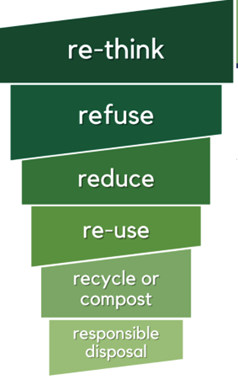Most of us have heard the three R’s: Reduce, Reuse, Recycle. Since that time, there have been creative extensions that include rethinking and refusing. What do these words really mean? Why are they in a particular order? They are a hierarchy to represent what provides the greatest benefit: benefit to your pocketbook, benefit to the environment.
Choosing Products for Sustainability

The ten questions on choosing products for sustainability, help guide thoughtful purchasing decisions. The first question, Do I really need the product? can result in thought-provoking alternatives such as sharing or borrowing, inventive solutions as well as more thoughtful and reduced consumption.
- Do I really need the product?
- Is the product safe to use?
- Is it practical, durable, of good quality with a timeless design?
- Is the product made from renewable or recycled materials taken in a sustainable way?
- Are the manufacturing practices moving towards sustainability?
- How will I dispose of the product and with what impacts?
- What kind of package does the product have?
- How far has the product been shipped to reach the retail outlet?
- Is the product a good value for the money?
- Is there some environmental, health, personal, or economic benefit that outweighs the product’s environmental costs?
– from Debra Dadd-Redalia, Sustaining the Earth
Re-Think
- Share and borrow items
- Give experiences as gifts and rethink favors at events
- ASK: How do we re-think systems to avoid needless/wasteful consumption
Refuse
- Avoid freebies at events which collect dust in your closet
- Say no to plastic – use cloth bags, reusable bottles and to-go containers
Reduce – Buy Less Stuff
- Avoid packaging whenever you can.
- Take reusable bags and produce bags.
- Use reusable containers and take your mug.
- When something breaks, see if you can get it fixed. Bring it to a local repair fair
- Reduce use of single use paper; use cloth napkins, rags, and washclothes
Reuse
- Shop at secondhand stores.
- Subscribe to the Bold Reuse container services. Find Bold Reuse containers at New Seasons for use at the deli, bulk containers and olive bar. Many Portland area restaurants use Bold Reuse containers for to-go use.
- Reuse wrapping paper or create your own from brown paper bags or newspapers.
- When you have an item you no longer need, find someone who can use it on the Trash Nothing (free) website or donate it.
- When you need something on an occasional basis, check if it is available in the Lake Oswego Library of Things, or see if you can borrow it from a friend or neighbor
Recycle Wisely
If you use curbside recycling, verify that your items are on the Clackamas County curbside recycling list before putting them in the recycling bin.
If you have questions
- Call Metro’s Recycling Information Hotline at 503-234-3000
- Email Clackamas County at wasteinfo@clackamas.us
How effective is recycling for the materials we commonly recycle?
- Metals – recycling metals is very effective. For example, an aluminum can is almost infinitely recyclable and it is less energy intensive than making new cans. Manufacturing a new can is so energy intensive that a recycled aluminum can has a 95 percent smaller carbon footprint than making that same can from virgin aluminum.
- Glass – most glass (bottles and jars) can be recycled again and again.
- Paper – paper recycling is valuable and saves lots of emissions and trees. However, the effectiveness is limited by the number of times it can be recycled without degradation.
- Plastics are the most problematic because there are so many types which are not recyclable. The key to sustainability is to avoid plastic whenever you can.